Anpassungsfähigkeit und Resilienz des Finanzsystems
Diese Forschungsgruppe untersucht kritische Aspekte der Anpassungsfähigkeit und Widerstandsfähigkeit von Finanzsystemen. Sie analysiert die Auswirkungen von Naturkatastrophen auf Finanzsysteme, die Auswirkungen politischer Präferenzen für die grüne Transformation und die Bedeutung von Kultur in den Volkswirtschaften.
Forschungscluster
Finanzresilienz und RegulierungIhr Kontakt

Mitglied - Abteilung Finanzmärkte
PROJEKTE
07.2016 ‐ 12.2018
Relationship Lenders and Unorthodox Monetary Policy: Investment, Employment, and Resource Reallocation Effects
Leibniz-Gemeinschaft
We combine a number of unique and proprietary data sources to measure the impact of relationship lenders and unconventional monetary policy during and after the European sovereign debt crisis on the real economy. Establishing systematic links between different research data centers (Forschungsdatenzentren, FDZ) and central banks with detailed micro-level information on both financial and real activity is the stand-alone proposition of our proposal. The main objective is to permit the identification of causal effects, or their absence, regarding which policies were conducive to mitigate financial shocks and stimulate real economic activities, such as employment, investment, or the closure of plants.
01.2015 ‐ 12.2019
Interactions between Bank-specific Risk and Macroeconomic Performance
Deutsche Forschungsgemeinschaft (DFG)
Referierte Publikationen
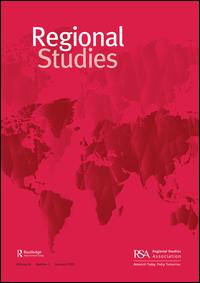
Social Capital and Regional Innovation: Evidence from Private Firms in the US
in: Regional Studies, Nr. 1, 2023
Abstract
In this study we investigate whether and to what extent social capital may affect regional innovation by focusing on private firms in the United States. We document that regional social capital is positively associated with the quantity, quality and novelty of county-level innovation by private firms. In addition, we find that the positive relation between social capital and regional innovation is more prominent in counties with a lower supply of financial capital. We also report that social capital is complementary to investments in research and development to produce inventive outcomes in local areas. Using a spatial Durbin model, we provide evidence that regional social capital has significant spillover effects in boosting the innovation activities of neighbouring counties.
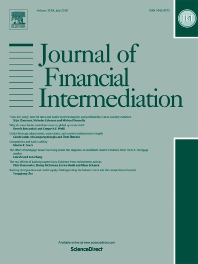
The Disciplining Effect of Supervisory Scrutiny in the EU-wide Stress Test
in: Journal of Financial Intermediation, January 2023
Abstract
Relying on confidential supervisory data related to the 2016 EU-wide stress test, this paper presents novel empirical evidence that supervisory scrutiny associated to stress testing has a disciplining effect on bank risk. We find that banks that participated in the 2016 EU-wide stress test subsequently reduced their credit risk relative to banks that were not part of this exercise. Relying on new metrics for supervisory scrutiny that measure the quantity, potential impact, and duration of interactions between banks and supervisors during the stress test, we find that the disciplining effect is stronger for banks subject to more intrusive supervisory scrutiny during the exercise. We also find that a strong risk management culture is a prerequisite for the supervisory scrutiny to be effective. Finally, we show that a similar disciplining effect is not exerted neither by higher capital charges nor by more transparency and related market discipline induced by the stress test.

Corporate Culture and Firm Value: Evidence from Crisis
in: Journal of Banking and Finance, January 2023
Abstract
Based on the Competing Values Framework (CVF), we score 10-K text to measure company culture in four types (collaborative, controlling, competitive, and creative) and examine its role in firm stability. We find that firms with higher controlling culture fared significantly better during the 2008–09 crisis. Firms with stronger controlling culture experienced fewer layoffs, less negative asset growth, greater debt issuance, and increased access to credit-line facilities during the crisis. The positive effect of the controlling culture is stronger among the financially-constrained firms. Overall, the controlling culture improves firm stability through greater support from capital providers.
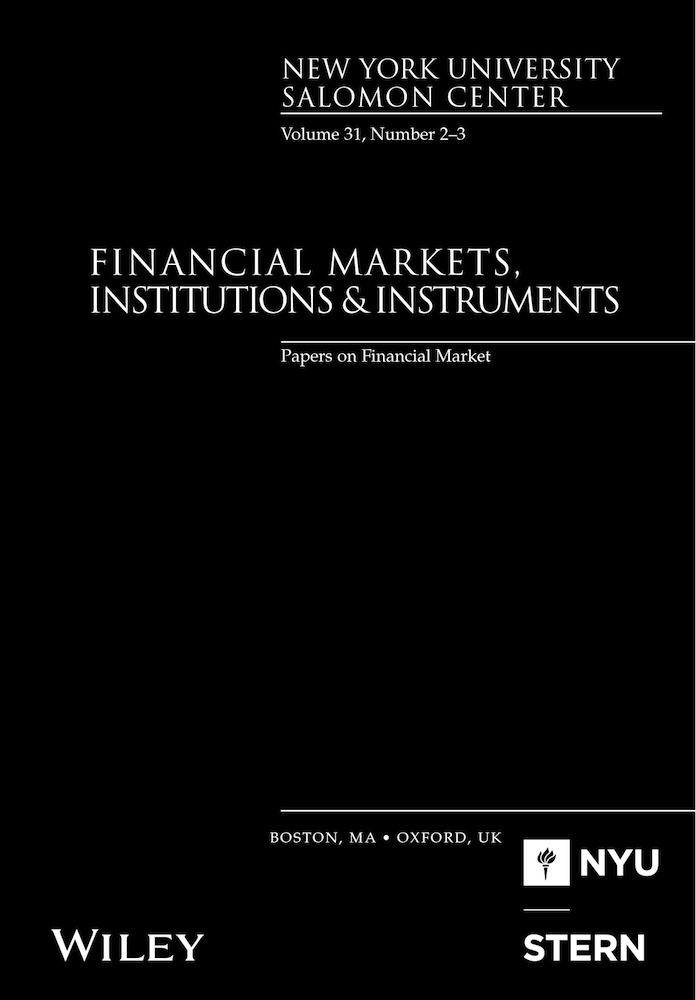
Environmental Reputational Risk, Negative Media Attention and Financial Performance
in: Financial Markets, Institutions and Instruments, Nr. 4, 2022
Abstract
Tracing negative media attention, this paper investigates the effect of reputational risk on firm value. Decomposing reputational damage into environmental, social and corporate-governance dimensions, it reports that environmental reputational risk has the most significant negative effect on price earnings, i.e., firms exposed to environmental risk are likely to be priced at a discount or charged a higher risk premium when discounting future earnings.
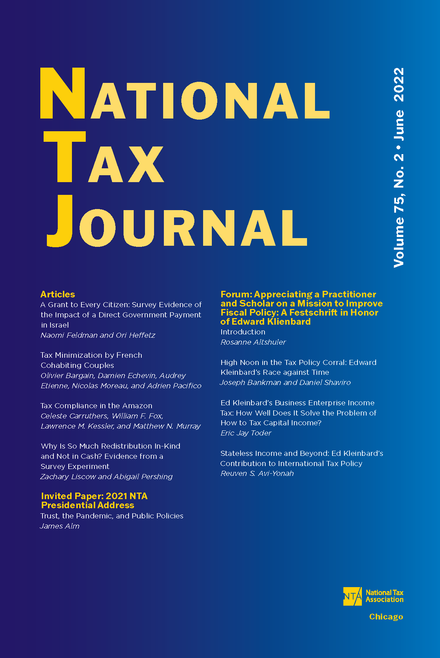
The Impact of Financial Transaction Taxes on Stock Markets: Short-Run Effects, Long-Run Effects, and Reallocation of Trading Activity
in: National Tax Journal, Nr. 3, 2022
Abstract
We investigate the French 2012 financial transaction tax (FTT) and find robust evidence for anticipation effects before the implementation date. Controlling for short-run effects, we only find weak evidence for a long-run reduction in trading activity. Thus, the main impact of the French FTT on trading activity is short-run. In line with liquidity clientele effects, we find a more potent effect for low-liquidity stocks and a reallocation of trading to high-liquidity stocks from the Supplemental Liquidity Provider (SLP) program. Finally, we find weak evidence for a persistent volatility reduction but no indication of a significant FTT impact on price efficiency.
Arbeitspapiere
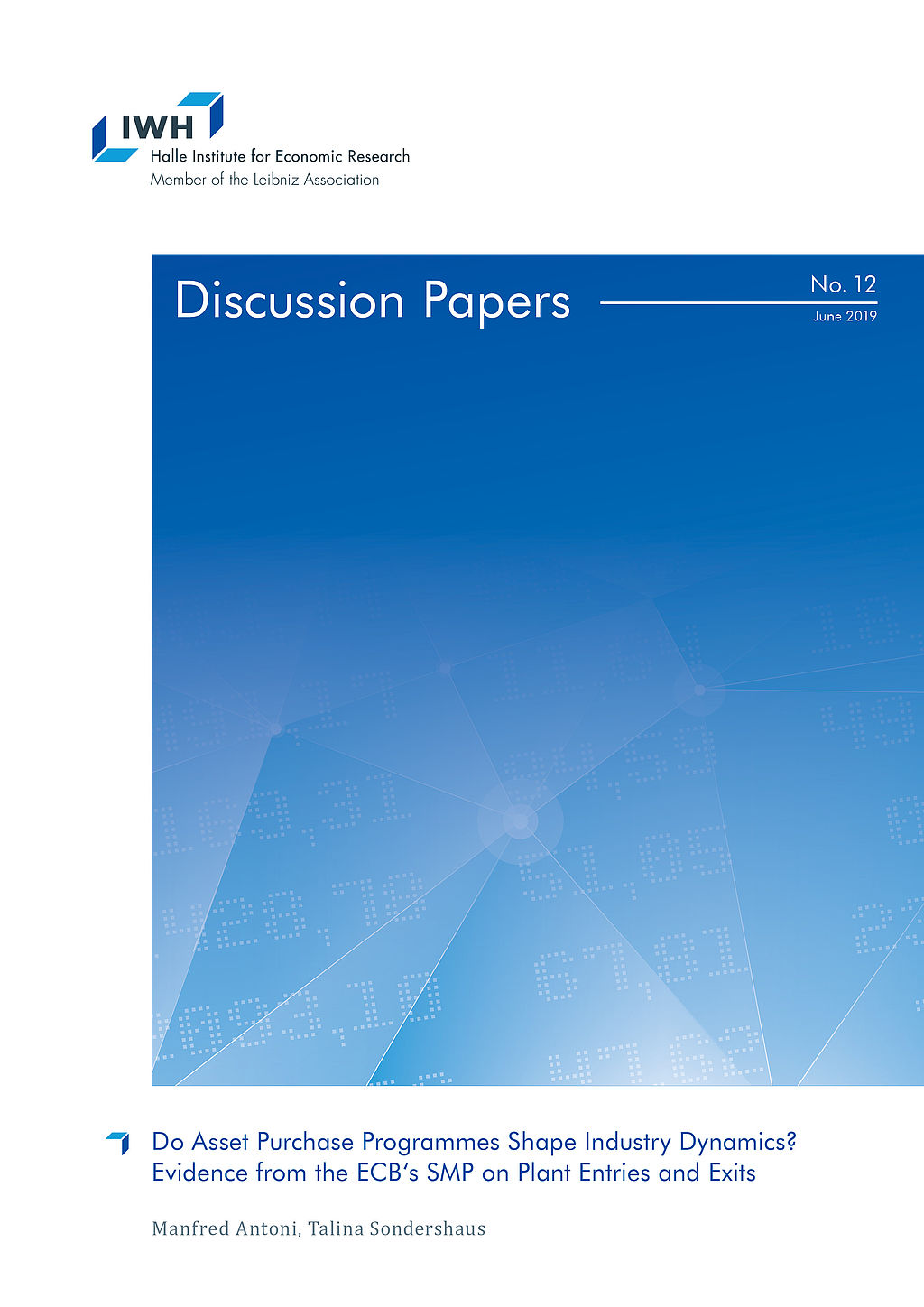
Do Asset Purchase Programmes Shape Industry Dynamics? Evidence from the ECB's SMP on Plant Entries and Exits
in: IWH Discussion Papers, Nr. 12, 2019
Abstract
Asset purchase programmes (APPs) may insulate banks from having to terminate relationships with unproductive customers. Using administrative plant and bank data, we test whether APPs impinge on industry dynamics in terms of plant entry and exit. Plants in Germany connected to banks with access to an APP are approximately 20% less likely to exit. In particular, unproductive plants connected to weak banks with APP access are less likely to close. Aggregate entry and exit rates in regional markets with high APP exposures are also lower. Thus, APPs seem to subdue Schumpeterian cleansing mechanisms, which may hamper factor reallocation and aggregate productivity growth.
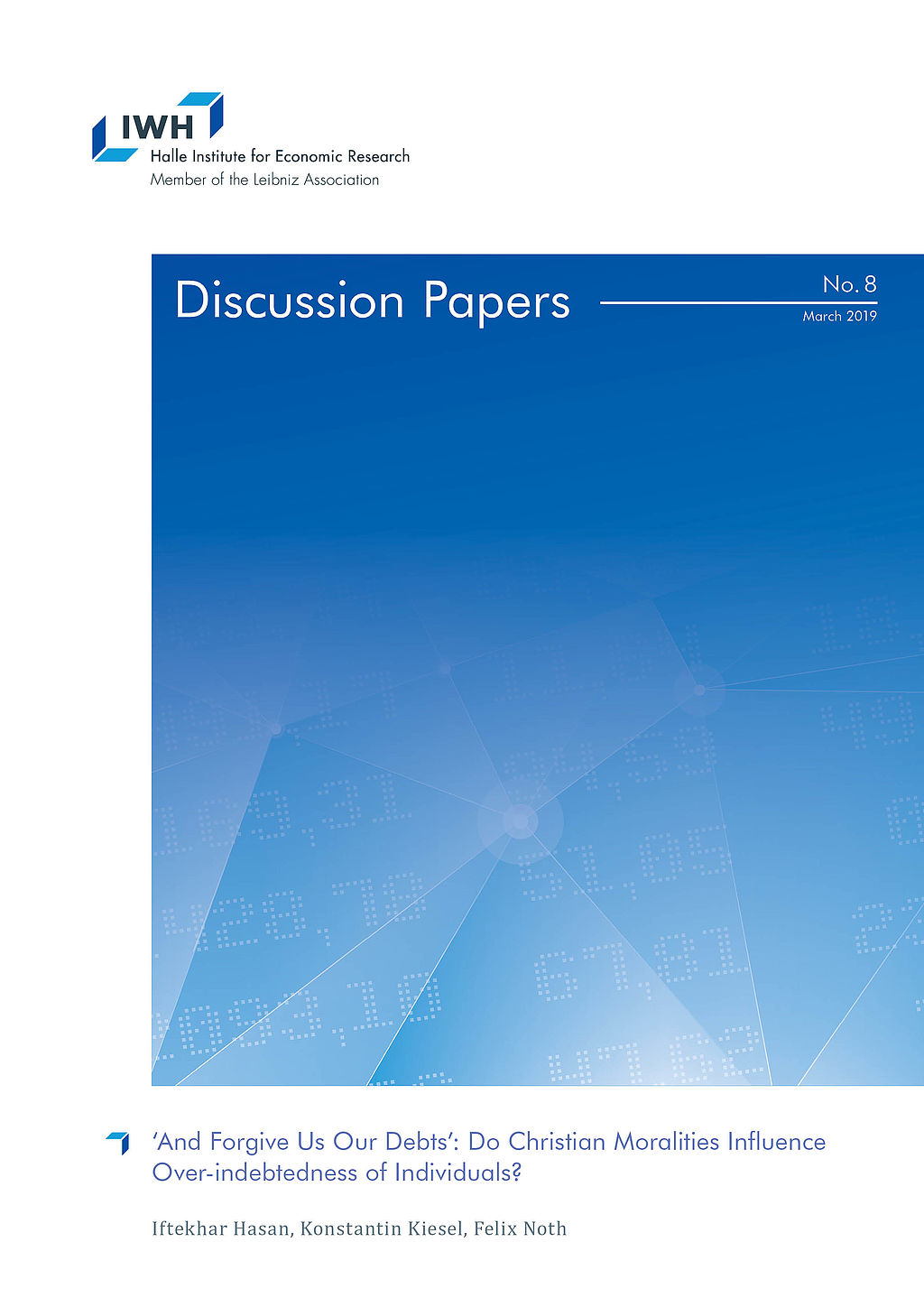
‘And Forgive Us Our Debts’: Do Christian Moralities Influence Over-indebtedness of Individuals?
in: IWH Discussion Papers, Nr. 8, 2019
Abstract
This paper analyses whether Christian moralities and rules formed differently by Catholics and Protestants impact the likelihood of households to become overindebted. We find that over-indebtedness is lower in regions in which Catholics outweigh Protestants, indicating that Catholics‘ forgiveness culture and a stricter enforcement of rules by Protestants serve as explanations for our results. Our results provide evidence that religion affects the financial situations of individuals and show that even 500 years after the split between Catholics and Protestants, the differences in the mind-sets of both denominations play an important role for situations of severe financial conditions.
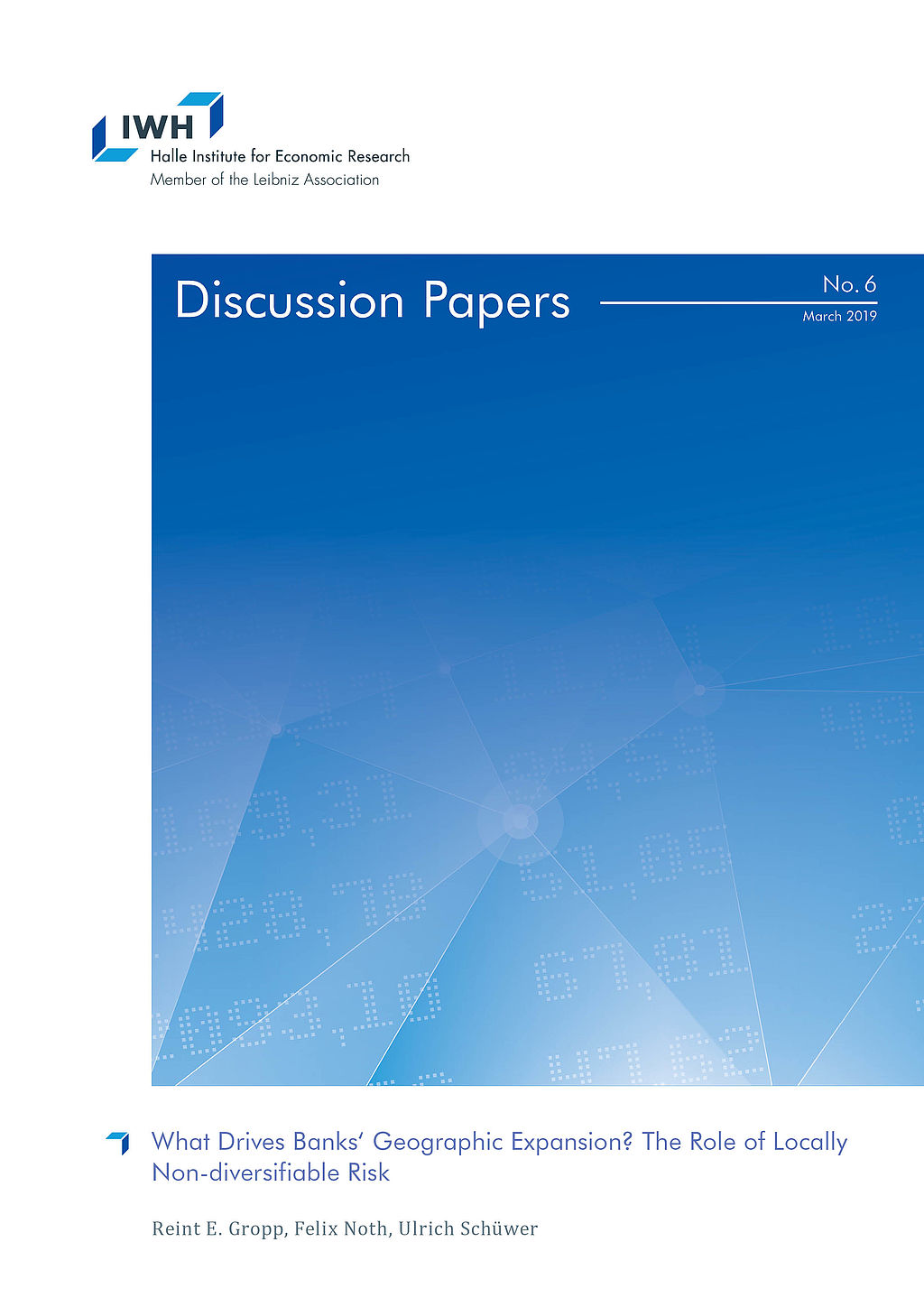
What Drives Banks‘ Geographic Expansion? The Role of Locally Non-diversifiable Risk
in: IWH Discussion Papers, Nr. 6, 2019
Abstract
We show that banks that are facing relatively high locally non-diversifiable risks in their home region expand more across states than banks that do not face such risks following branching deregulation in the 1990s and 2000s. These banks with high locally non-diversifiable risks also benefit relatively more from deregulation in terms of higher bank stability. Further, these banks expand more into counties where risks are relatively high and positively correlated with risks in their home region, suggesting that they do not only diversify but also build on their expertise in local risks when they expand into new regions.
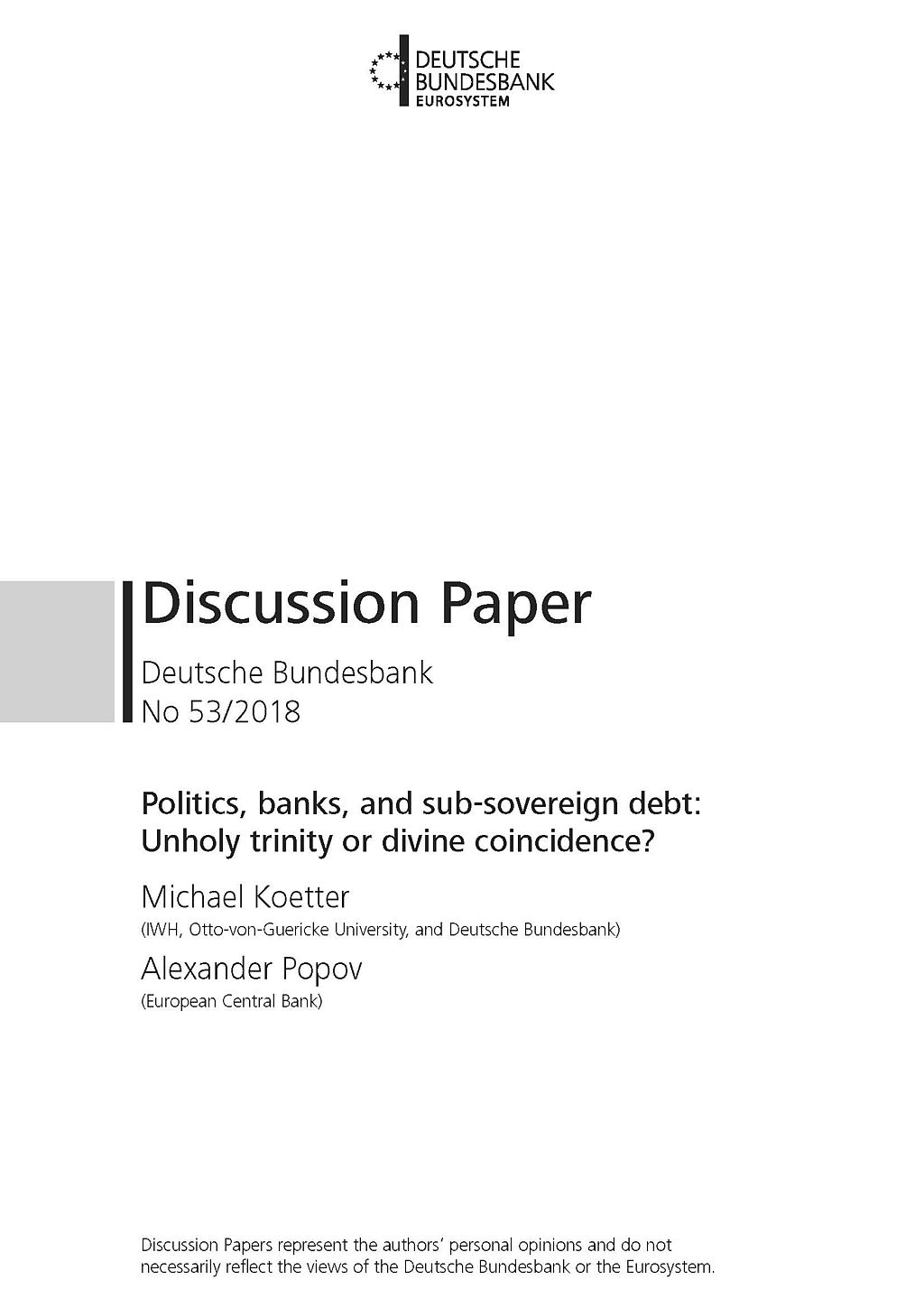
Politics, Banks, and Sub-sovereign Debt: Unholy Trinity or Divine Coincidence?
in: Deutsche Bundesbank Discussion Paper, Nr. 53, 2018
Abstract
We exploit election-driven turnover in State and local governments in Germany to study how banks adjust their securities portfolios in response to the loss of political connections. We find that local savings banks, which are owned by their host county and supervised by local politicians, increase significantly their holdings of home-State sovereign bonds when the local government and the State government are dominated by different political parties. Banks' holdings of other securities, like federal bonds, bonds issued by other States, or stocks, are not affected by election outcomes. We argue that banks use sub-sovereign bond purchases to gain access to politically distant government authorities.

May the Force Be with You: Exit Barriers, Governance Shocks, and Profitability Sclerosis in Banking
in: Deutsche Bundesbank Discussion Paper, Nr. 49, 2018
Abstract
We test whether limited market discipline imposes exit barriers and poor profitability in banking. We exploit an exogenous shock to the governance of government-owned banks: the unification of counties. County mergers lead to enforced government-owned bank mergers. We compare forced to voluntary bank exits and show that the former cause better bank profitability and efficiency at the expense of riskier financial profiles. Regarding real effects, firms exposed to forced bank mergers borrow more at lower cost, increase investment, and exhibit higher employment. Thus, reduced exit frictions in banking seem to unleash the economic potential of both banks and firms.


















